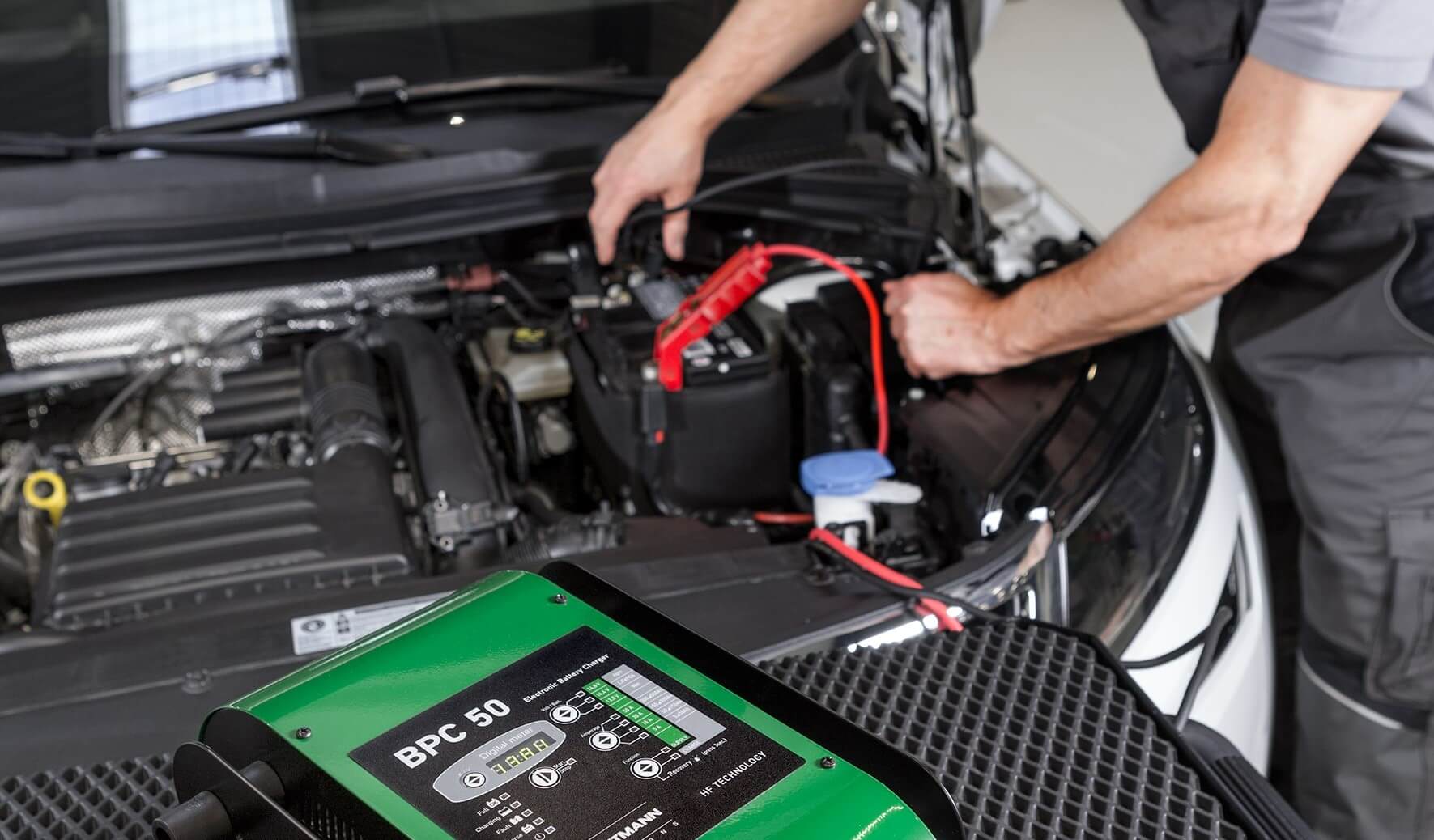Charging your car battery overnight is safe as long as you use a suitable charger. Avoid overcharging.
Charging your car battery overnight allows for a complete recharge, ensuring your vehicle’s readiness for the next day’s use. Before embarking on this process, it is crucial to check your battery’s compatibility with overnight charging to avoid any potential risks.
By following simple safety measures and using the right equipment, you can efficiently charge your car battery without any issues. It is vital to understand the proper procedure and guidelines to ensure the safety and longevity of your vehicle’s battery. Let’s explore the essential steps and precautions needed for effectively charging your car battery overnight.

Credit: www.howacarworks.com
Importance Of Charging Your Car Battery
Regularly charging your car battery is essential to ensure that your vehicle operates smoothly and reliably. A well-charged battery is the lifeblood of your car’s electrical system and is responsible for powering essential components such as the ignition system, lights, and accessories. Without a fully charged battery, you may find yourself stranded with a vehicle that won’t start or experiencing various electrical malfunctions.
Why You Should Charge Your Car Battery Regularly
Charging your car battery regularly is crucial to maintain its longevity and performance. Here’s why:
- Prevents battery drainage: When a car sits idle for an extended period, the battery can gradually lose its charge. Regular charging ensures that your battery remains fully energized, preventing unexpected drainage and subsequent starting problems.
- Extends battery life: By charging your battery regularly, you allow it to maintain optimal voltage levels. This helps prevent sulfation, a common issue where lead sulfate crystals accumulate on the battery plates, reducing its capacity and shortening its lifespan.
- Ensures readiness: A fully charged battery ensures your vehicle is always ready to go. Whether it’s a daily commute or an emergency situation, knowing that your battery is charged provides peace of mind and eliminates the worry of a dead battery when you need it the most.
The Benefits Of Overnight Charging
Charging your car battery overnight offers several advantages:
- Convenience: Overnight charging allows you to take advantage of downtime when your vehicle is not in use. Simply connect the battery charger before going to bed, and wake up to a fully charged battery ready for the day.
- Optimal charging time: Overnight charging typically provides an extended period for the battery to charge fully. This slow and steady charging process helps ensure that the battery reaches its maximum capacity, increasing its overall performance and lifespan.
- Efficiency: Charging your battery overnight allows you to take advantage of off-peak electricity rates, saving you money in the long run. Additionally, some advanced chargers have energy-efficient modes that reduce energy consumption during the charging process.
Remember, proper charging techniques, such as using a compatible battery charger and following manufacturer guidelines, are crucial to ensure safe and efficient charging. By understanding the importance of charging your car battery regularly and the benefits of overnight charging, you can maintain a reliable and long-lasting battery for your vehicle.
Preparing Your Car For Overnight Charging
Electric cars are gaining popularity for their eco-friendly appeal and low maintenance costs. If you’re considering charging your car battery overnight, proper preparation is crucial to ensure safety and efficiency. Preparing your car for overnight charging involves checking the battery’s condition and inspecting/cleaning the terminals. These essential steps will help you make the most out of your overnight charging process and extend the lifespan of your electric vehicle.
Checking The Battery’s Condition
Before initiating an overnight charge, it’s important to verify the overall health of your car battery. Use a multimeter to test the battery’s voltage, ensuring it meets the manufacturer’s recommended levels. Inspect for any signs of corrosion, leakage, or physical damage to the battery casing as these issues can hinder optimal charging and pose safety risks.
Inspecting And Cleaning Battery Terminals
Dirty or corroded battery terminals can impede the charging process and cause electrical inefficiencies. Thoroughly examine the terminals for any buildup of corrosion or grime. Use a wire brush or battery terminal cleaner to gently scrub away any accumulated debris. This will ensure a solid connection during charging and contribute to a more effective transfer of power within the battery system.
Safety Precautions For Overnight Charging
Ensure to charge your car battery in a well-ventilated area away from flammable materials like paper or fabric.
- Select a charger with built-in protection against overcharging and short circuits.
- Always read the manufacturer’s instructions for proper usage.
- Don’t leave the battery on charge for more than the recommended time.
- Keep the charging area free from clutter to prevent overheating risks.
Step-by-step Guide: How To Charge Your Car Battery Overnight
Step-by-Step Guide: How to Charge Your Car Battery Overnight
Gathering The Necessary Equipment
Gather a battery charger, safety goggles, gloves, and the user manual for your car.
Connecting The Battery Charger To Your Car
Turn off your car’s engine, identify the positive and negative terminals on the battery.
Setting The Charging Parameters
Match the voltage settings of the charger to your car’s battery, ensure correct polarity.
Monitoring The Charging Process
Charge the battery overnight, periodically check the charger for any abnormalities.
Factors To Consider Before Overnight Charging
Charging your car battery overnight can be a convenient way to ensure it stays powered, but it’s essential to consider several factors before doing so. By taking these factors into account, you can prolong the life of your battery and ensure safety during the charging process.
Battery Age And Condition
The age and condition of your car battery play a crucial role in its ability to safely charge overnight. Older batteries may be more susceptible to overcharging or overheating, which can lead to potential safety hazards. Similarly, a battery in poor condition, such as one with corroded terminals or physical damage, may not be suitable for extended charging periods. Prioritize assessing the age and condition of your battery before deciding to charge it overnight.
Battery Capacity And Charge Level
Understanding the capacity and current charge level of your battery is essential when considering overnight charging. Different batteries have varying capacities, and charging a battery with a higher capacity overnight may require more time to reach a full charge. Additionally, if your battery is already at a high charge level, the risk of overcharging during an overnight charge increases. It’s important to monitor the capacity and charge level of your battery to ensure safe and efficient overnight charging.
Environmental Conditions
The environmental conditions in which you plan to charge your car battery overnight can significantly impact its safety. Extreme temperatures, whether excessively hot or cold, can affect the charging process and potentially compromise the battery’s integrity. Factors such as adequate ventilation and protection from moisture should also be considered to prevent any potential safety risks. Evaluate the environmental conditions where you intend to charge your battery and make adjustments accordingly for a safe overnight charging experience.
Common Mistakes To Avoid When Charging Your Car Battery Overnight
Charging your car battery overnight is a convenient way to ensure that your vehicle is ready to go in the morning. However, it’s essential to avoid certain common mistakes that can lead to potential risks and damage to your battery.
Using An Incorrect Charging Method
One of the most common mistakes people make when charging their car battery overnight is using an incorrect charging method. It’s important to understand the charging requirements of your specific battery type. Some batteries require a slow and steady charge, while others can handle a faster charge. Using an incorrect charging method can result in overcharging or undercharging the battery, which can damage its lifespan and performance. Always refer to the manufacturer’s instructions or consult a professional to determine the correct charging method for your battery.
Neglecting Battery Maintenance
Another mistake to avoid when charging your car battery overnight is neglecting its maintenance. Regularly inspecting and cleaning the battery terminals is crucial to ensure a secure connection. Corrosion build-up on the terminals can hinder the charging process and weaken the battery’s performance. Additionally, regularly checking the battery’s water level, if applicable, and keeping it within the recommended range is essential. Neglecting battery maintenance can lead to inefficient charging and potential damage to the battery.
Leaving Accessories On During Charging
Leaving accessories on during the charging process is another common mistake to avoid. While it might be tempting to keep the radio or lights on while charging, it can put unnecessary strain on the battery. These accessories consume power, which diverts the charging current away from the battery. As a result, the battery may not receive a full charge, leading to reduced performance and a shorter lifespan. Ensure that all accessories are turned off during the charging process to optimize the charging efficiency and extend the battery’s life.
Avoiding these common mistakes when charging your car battery overnight is crucial to ensure its longevity and performance. By using the correct charging method, performing regular maintenance, and avoiding unnecessary drains on the battery, you can enjoy a reliable and long-lasting battery that will keep your vehicle running smoothly.
How Long Should You Charge Your Car Battery Overnight?
How Long Should You Charge Your Car Battery Overnight?
Charging your car battery overnight can be a convenient and efficient way to ensure your vehicle is ready to go in the morning. However, you may be wondering how long it takes to fully charge your car battery overnight. The answer to this question depends on several factors, including the charging time of your specific battery, as well as external factors that can affect the charging process.
Understanding Charging Times
When determining how long to charge your car battery overnight, it’s essential to understand the charging times associated with different battery types. Most car batteries fall into two categories: conventional lead-acid batteries and newer lithium-ion batteries.
- Conventional Lead-Acid Batteries: These batteries are the most common type found in vehicles today. On average, it can take anywhere from 6 to 12 hours to fully charge a conventional lead-acid battery.
- Lithium-Ion Batteries: Lithium-ion batteries are becoming more popular due to their longer lifespan and faster charging capabilities. These batteries typically take around 4 to 6 hours to fully charge.
It’s important to note that these are general guidelines and individual charging times may vary depending on the specific make and model of your car battery.
Factors That Affect Charging Time
Several factors can influence the charging time of your car battery, even when charging overnight. Understanding these factors can help you determine how long you should charge your specific battery to achieve optimal results.
| Factors | Description |
|---|---|
| Battery Size | A larger battery may require more time to charge fully compared to a smaller one. |
| Battery Age | An older battery may take longer to charge than a newer one, as its capacity may have deteriorated over time. |
| Charging Method | The type of charger you use can affect the charging time. Fast chargers are designed to charge batteries more quickly than standard chargers. |
| State of Charge | If your battery is heavily discharged, it may take longer to charge compared to a battery with a higher initial state of charge. |
| Temperature | Extreme temperatures, whether hot or cold, can affect the charging process and may require additional time to reach a full charge. |
By taking these factors into consideration, you can estimate how long it will take to charge your car battery overnight more accurately.
Credit: www.quora.com

Credit: www.hella-bulbs.com
Conclusion
Charging your car battery overnight can be safe if done correctly. It’s essential to use a high-quality charger and ensure proper ventilation in the charging area. As with any electrical equipment, it’s important to follow the manufacturer’s guidelines and regularly inspect the battery for signs of wear.
By taking these precautions, you can safely charge your car battery overnight without any issues.


